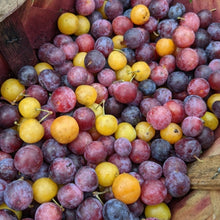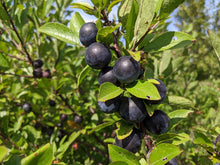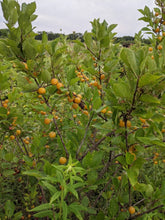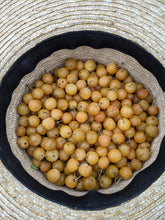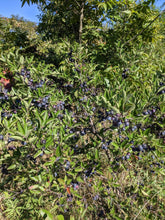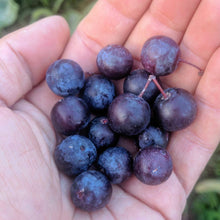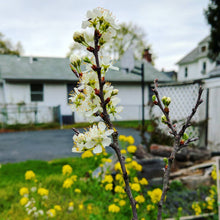Cape May Beach Plum
Regular price
$5.00
Sale
Prunus maritima
Origin: Cape May, New Jersey
Improvement status: Wild
Seeds per packet: 10
BOTANICAL SAMPLE - NOT GERMINATION TESTED
Life cycle: Perennial
Beach plums are native to the northeast US coast from Virginia to Maine. They are most widely known and consumed in New Jersey and Massachusetts, especially in Cape May and Cape Cod, where they are both harvested wild and cultivated on a small scale. The fruit of beach plums are small and round, varying in size from penny to quarter, and varying in color from yellow-orange to red to blue to purple. The flavor — sour with a touch of sweetness and sometimes slight bitterness — is usually quite nice out of hand, but is greatly improved by cooking or brewing. It makes an utterly delicious jam or jelly, a fine wine, and a lovely vinegar too. Leaves can be used as a yellow or green dye, and a dark grey to green dye can be obtained from the fruit.
As a wild plant native to highly exposed dune environments, beach plums are very easy to grow and take to garden cultivation quite well. In fact, due to their wild nature, they thrive with near complete neglect. In our area, they produce delicious fruit with no spray, no fertilizer, and no watering. Being a dune plant, they root themselves very deeply.
A beach plum can grow into a tree up to 10 or 12 feet tall, but typically becomes a shrubby-looking bush. Wild beach plums are noted for having off-years when none of the beach plums in an area produce any fruit. Sometimes this is due to very late frosts, but sometimes the reason is unclear. This beach plum improvement breeding project seeks to identify or develop cultivars with more regular bearing, larger fruit, and more productivity. Anyone who purchases these seeds is encouraged to sign up for the project here: www.ExperimentalFarmNetwork.org.
Seeds are more likely to sprout with 60-90 days of cold moist stratification (kept in a sealed plastic bag or glass jar with peatmoss or potting soil in the fridge should do the trick), though half of the seeds in this year's lot were pre-stratified, so they should pop pretty quickly. The seeds we're selling are a mix of wild harvested seed from Cape May County, New Jersey and seed grown by EFN (Nate) in Elmer, New Jersey.
NOTE: Because we have a limited amount of these seeds and each seed is unique and potentially precious, we do not conduct germination tests (which would require sacrificing hundreds of seeds) on breeding mixes like this one. But these seeds were harvested in 2023 and processed appropriately. If buyers are dissatisfied, please contact us.








